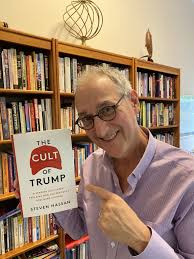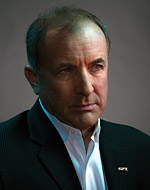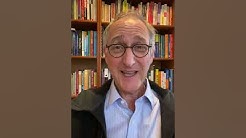By Brian Birmingham
I am a former member of an abusive authoritarian group, or “cult.”
As a teenager I was placed, by my parents, in a “troubled teens” program,” which is now defunct. The program was not religious, but it did use behavioral modification techniques and employed coercive persuasion to gain undue influence over its participants. The stated objective was to mold us into adults that would stay sober and adhere to the program’s principles.
In my opinion this was a generally toxic and harmful program. It took me almost fifteen years to begin to recognize the harm that occurred there. This program included confrontational and humiliating pseudo-therapies. Instead of helping people the program hurt me and the other teens subjected to it.
As an adult in my 30s I read Steve Hassan’s book “Combatting Cult Mind Control.” At that time, I was involved in yet another authoritarian organization called a “cult” in Dallas, Texas. After leaving this group, known as the Trinity Foundation, in August of 2006, someone recommended Steve Hassan’s book to me.
This is when I learned about what Steve Hassan calls the BITE model of mind control.
Reading the book was helpful in processing what had happened to me. Subsequently, I experienced a period of intense self-examination and went through a recovery program at a place called Meadow Haven, in Lakeville, Massachusetts. While at Meadow Haven I unraveled the effects of the program for troubled teens as well as my other cultic experience. I was also diagnosed as being within the autism spectrum. I was finally diagnosed definitively with Asperger’s syndrome. Learning this helped me to better understand my life and introverted nature.
The combination of undiagnosed autism and the trauma of going through an abusive authoritarian group as a teen profoundly affected my life and made me vulnerable.

Steve Hassan
In July of 2010 I was introduced to Steve Hassan by a mutual friend at a conference about cults. At the time I lived in the Boston area not far from him. Steve gave me his business card and told me to contact him when I got back to Boston. I did and he offered me a job at Freedom of Mind (FOM). I became his research assistant, performing various tasks for FOM for almost three years. I quit in 2013, which ended my association with Steve Hassan.
Today, I see and understand Steve in a whole new light and want to share those insights. I feel that he often exploits fragile former cult members for his own personal benefit.
In the early stages of my recovery Steve’s BITE model introduced me to psychological concepts which I’d never known about before. The ideas in his first book “Combating Cult Mind Control” helped me realize, that contrary to what I’d believed about myself for so long, it was not so much a matter of what was wrong with me, but rather what was done to me that was wrong.
There are different types of cults. They are not all religious in nature.
Steve Hassan, through his work, taught me these things.
But I now know that Steve did not originate the ideas he wrote about. Instead, his BITE model is derivative and the relabeled ideas of others. Steve simply rebranded those ideas and he presents them essentially as his own without meaningful detailed attribution. This seems to me to be dishonest and deliberately misleading.
The BITE model is actually a composite of the work and original research of psychologist Margaret Singer, communication experts Flo Conway and Jim Siegelman, and psychiatrist Robert Jay Lifton.
Let me spell this out specifically.
“B,” for behavior control, is based upon the work of Lifton and Singer, accomplished decades before Steve’s first book was published.
“I,” for information control, is predicated upon what Conway and Siegelman first identified as “information disease” within their book “Snapping” published in 1978.
“T,” for the control of thinking, is derived from Lifton’s book “Thought Reform and the Psychology of Totalism” published in 1961.
“E,” for emotional control, also is based upon the previous work of Conway and Siegelman in their book “Holy Terror” published in 1982.
Steve Hassan did not identify or originate these specific principles of understanding and identifying how authoritarian groups and leaders dominate and control people. He merely studied them, collected and copied them and then rebranded them for himself. Steve presents the BITE model as his own, but it is not his original thought, even though he attempts to pass it off as such to the public.
Steve is very good at marketing and sales and he’s managed to make a lot of money from his books, cult interventions and consulting work. He is certainly a wealthy man. But the BITE model, which he promotes as the foundation for his work was never really his own original work. Steve just cobbled it together as a marketing ploy based upon the work of others. And to claim otherwise is academically dishonest and inherently wrong.
The BITE model in my opinion is also deeply flawed, at least in the way Steve loosely applies it. For anyone with an agenda it is fairly easy to use it to indict almost any group or person you don’t like.
For example, someone who doesn’t like Christians could use the BITE model to indict Jesus by selectively going through the New Testament to prove that Jesus was a “cult leader.” Or use the BITE model to do the same thing with the words of Paul.
Moreover, a person with a political or social bias can use the BITE model to frame a politician as a “cult leader” or call a political party a “cult.”
And someone manipulating this same BITE model can then claim that all those who disagree with him are somehow the “victims” of “mind control.”
This can also be seen as an effective marketing scheme to sell your services to “deprogram” all those perceived “victims.”
In my opinion this turns “Freedom of Mind” fairly upside down into a state of mind based upon a selective worldview and specific ideas that conform to those of what Steve Hassan thinks is acceptable.
Steve Hassan in his book “The Cult of Trump” contends that Donald Trump supporters don’t REALLY like Donald Trump, but are somehow instead the victims of “thought reform techniques” employed by the former president. And anyone that isn’t being so manipulated must be a bad person with racist or anti-Semitic sentiments. Or perhaps they may be psychologically or intellectually impaired.
It is important to recognize that cult experts don’t universally endorse Steve’s notions about Donald Trump and his supporters. Robert Jay Lifton noted, “Trump is not totalistic like [Shoko Asahara] the leader of [the Japanese cult] Aum Shinrikyo.” Michael Langone, Executive Director of the International Cultic Studies Association stated, “I can understand why people don’t like Trump,” However, Langone concluded “But to jump from not liking Trump to Trump as cult leader, I think, is a bit of a leap.”
Steve seems to think it’s his job to straighten everyone out so that they truly have genuine “freedom of mind” (pages 7, and 216 “The Cult of Trump”).
But here is the problem. What really is “freedom of mind” according to Steve Hassan?
It seems to me that when someone has such freedom Steve surmises that they will then pretty much see and interact with the world just like he does.
In his book Steve implies that authentically liberated minds will see the world just like him.
Is Steve trying to clone himself and become some sort of guru determining what is the right and wrong way to think and feel?
Isn’t that the typical behavior of a “cult leader”?
On page 231 of his book Steve suggests that we might need a new set of commandments in addition to the original Ten Commandments.
Steve writes, “People consensually abide by rules for the common good. That is also true of our social behavior–the Ten Commandments were established thousands of years ago as a mechanism for helping people get along in groups. They were also established as a form of social control, with their focus on worshiping ‘the one true God’. What we may need now are commandments that guide our ethical behavior as citizens, regardless of race, creed, ethnicity, or sexual or religious preference.”
Who will write these new commandments?
Will Steve be our new Moses?
Will Steve’s new commandments replace or supplement the existing ones?
Don’t we have enough commandments already?
Steve apparently wants something new that reflects his own worldview. All of this seems somewhat reminiscent of what Robert Jay Lifton calls a “Sacred Science.”
Lifton writes, “The totalist milieu maintains an aura of sacredness around its basic dogma, holding it out as an ultimate moral vision for the ordering of human existence. This sacredness is evident in the prohibition (whether or not explicit) against the questioning of basic assumptions, and in the reverence which is demanded for the originators of the Word, the present bearers of the Word, and the Word itself. While thus transcending ordinary concerns of logic, however, the milieu at the same time makes an exaggerated claim of airtight logic, of absolute ‘scientific’ precision. Thus, the ultimate moral vision becomes an ultimate science; and the man who dares to criticize it, or to harbor even unspoken alternative ideas, becomes not only immoral and irreverent, but also ‘unscientific.’ In this way, the philosopher kings of modern ideological totalism reinforce their authority by claiming to share in the rich and respected heritage of natural science.”
For most of 2005, I was in Baghdad serving as a medic in Operation Iraqi Freedom. As a medic, from time to time I was called upon to participate in patrols outside of our base perimeter. One day while patrolling, we had dismounted from our vehicles and were walking through a neighborhood. At one point, we stopped to take a rest. There was a group of young Iraqi boys playing soccer in a vacant lot across the street. The soccer ball was kicked into our midst. A little kid about ten or twelve years old asked our permission to retrieve the ball. We said yes, and then when he got the ball, I asked him if the people in his neighborhood liked the Americans. He said “No”. I asked, “Why not?” He said, “Because you’re all Jews” in a very matter-of-fact way, and ran off. All this child knew about America and the people who live there was what he learned from Saddam Hussein’s propaganda, and the anti-American, anti-Semitic culture in which he was raised. In a way, the boy lived in a type of bubble, from which he derived a distorted view of America and Americans.
Steve Hassan comes across as someone living in a bubble of his own. Just like the Iraqi kid I met in Baghdad, with his distorted view of America and Americans. Steve has his own ideological echo chamber that he inhabits and others that entertain alternative ideas and different views are summarily dismissed or labeled negatively.
“The Cult of Trump” also appears to dismiss or disregard that alternative ideas have a right to exist. This can be seen as a reflection of what Lifton calls the “dispensing of existence.”
Lifton writes, “Are not men presumptuous to appoint themselves the dispensers of human existence? Surely this is a flagrant expression of what the Greeks called hubris, of arrogant man making himself God. Yet one underlying assumption makes this arrogance mandatory: the conviction that there is just one path to true existence, just one valid mode of being, and that all others are perforce invalid and false. Totalists thus feel themselves compelled to destroy all possibilities of false existence as a means of furthering the great plan of true existence to which they are committed.”
Steve’s book raises some larger questions that need to be asked by its readers, which are applicable to everyone.
Is there such a thing as objective truth or must everything be based upon the bias of the believer?
Don’t we all need to be fact based and objective regardless of our political bias and world view and not allow our subjective sentiments cause us to negatively label others?
Isn’t hard objective evidence preferable to politicized characterizations like those within Steve’s often polemical book “The Cult of Trump”?
And finally, is it really useful to politicize the word “cult” turning it into a derisive pejorative label used to dismiss the existence of alternative political ideas?
In my opinion politicizing the word “cult” in this way serves no useful or factual purpose, but rather portrays a deeply distorted view of politics in America today.
Note: Brian Birmingham is a graduate of the University of Massachusetts in Boston with a BA in Psychology and Sociology. He is a native of Dallas, Texas and was once a member of the Trinity Foundation community. He later worked for Steven Hassan at Freedom of Mind.
BITE model, Donald Trump, Steven Hassan








